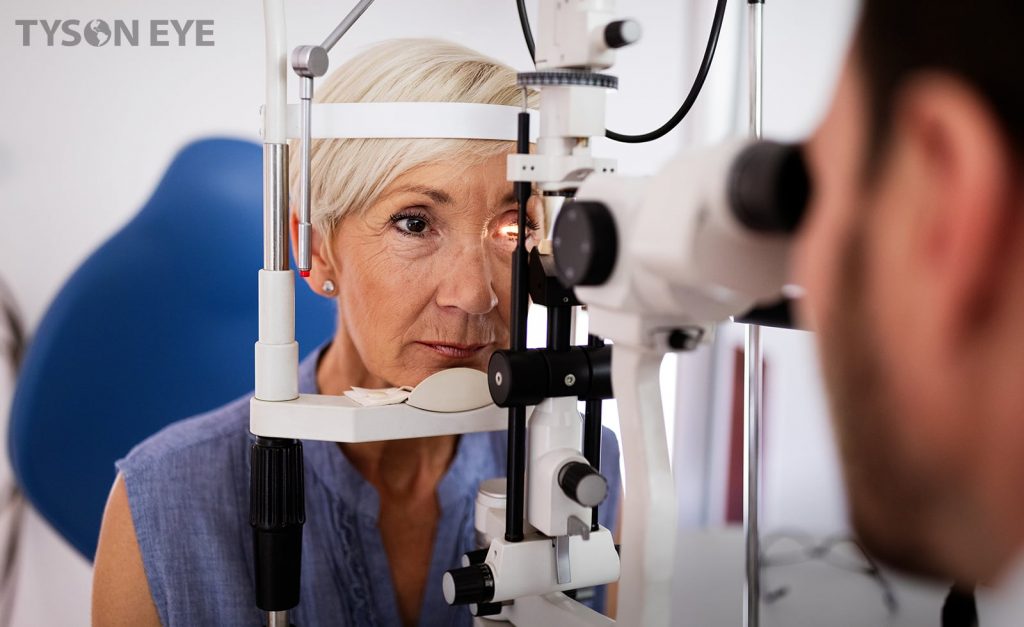You have probably wondered why eye exams matter and how often you should get them. When it comes to maintaining a healthy lifestyle, it’s safe to say most people would tell you the absolute must-dos include eating a healthy diet, exercising and getting regular checkups. Surprisingly, many might not include regular eye exams in their overall plan for healthy living. After all, if you’ve never experienced any issues with your vision, you may not think it’s necessary. Think again. Being proactive about your eye health is more than important, it’s essential. Here are some reasons why:
No Symptoms, No Problem!
Unfortunately, no symptoms can be a big problem. Many forms of eye disease can progress for a very long time with no detectable symptoms to the patient. For example, macular degeneration, which affects more than 10 million people in the U.S., often presents no symptoms in the early stages when preventive measures may be effective.
Glaucoma is another example of an eye condition that can occur gradually without being detected. Caused from fluid buildup and pressure in the eye, glaucoma damages the optic nerve. If glaucoma is detected in the early stages, treatments including eye drops, medication, and laser surgery are possible and can help prevent vision loss. Left undiagnosed, vision loss can occur with no way to reverse it.
Eye Exams Can Identify Other Health Issues
The human vision system is a complex one and many times, a vision related issue can point to other health issues. An eye exam can identify a number of other health concerns including:
- Thyroid disease – A common symptom of thyroid disease is bulging eyeballs.
- Hypertension – Or high blood pressure, can be detected by examining the small blood vessels in the back of the eye.
- Diabetes – If your eye doctor notices yellowish fluid or blood leaking from the capillaries in the retina, this can be a result of diabetes. Diabetic retinopathy can cause permanent vision loss.
- High cholesterol – When the cornea appears to have a yellow ring around it, this can be a sign of high cholesterol.
- Cancer – Basal cell carcinoma and ocular melanoma can be detected during an eye exam. The doctor may notice a change in pigmentation or the structure of the eye.
- Autoimmune diseases – Inflammation in the eyes could be a sign of an autoimmune disorder such as Lupus.
What Kind of Eye Exams are Available?
It’s important to understand the difference between a vision screening and a comprehensive eye exam. A vision screening is not a diagnostic exam, nor can it tell what may or may not be wrong with your eyes. It is relatively brief and more of a precursor to making an appointment with an eye doctor. You may have a vision screening to update your eyeglass prescription.
A comprehensive eye exam is performed by a qualified ophthalmologist or optometrist and is far more thorough. It will typically include the following elements:
- Detailed analysis of health, medication, and family vision history.
- Dilated eye exam using a special lens for viewing the inside of the eye, specifically, the retina and optic nerve.
- Fluid pressure check to test for glaucoma.
- Visual acuity test, or refraction test, to determine whether corrective lenses will improve your vision.
- Visual field testing to evaluate your peripheral vision.
How Often Should You Get an Eye Exam?
The majority of eye care professionals recommend a comprehensive eye exam every one to two years, depending on your vision history, age and risk factors. However, it is strongly recommended that children receive regular eye exams starting at six months of age to detect any vision impairment that could interfere with their learning ability.
At risk patients with a genetic history of eye disease or who may be suffering from diabetes, high blood pressure, or other vision impairing health condition, may need eye exams more frequently. When in doubt, consult a qualified eye care professional.
Whether you’re experiencing vision issues or not, be proactive with your eye health and schedule a comprehensive eye exam today with the professionals at Tyson Eye. With over 30 years of experience combining break-through technologies with compassion and quality care, we’ve helped thousands of people enjoy better vision. Click here to request an appointment.
